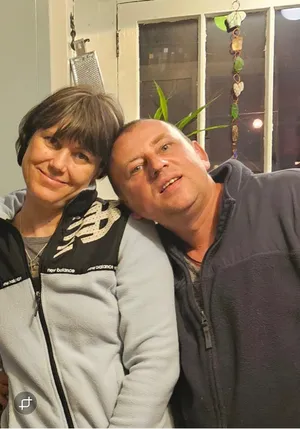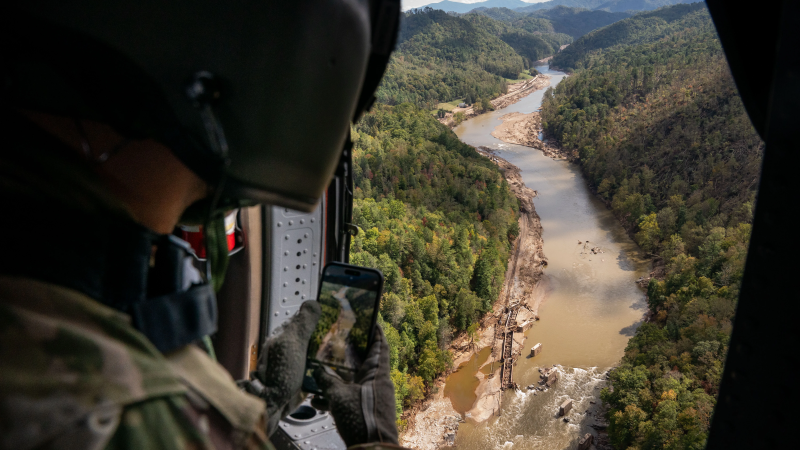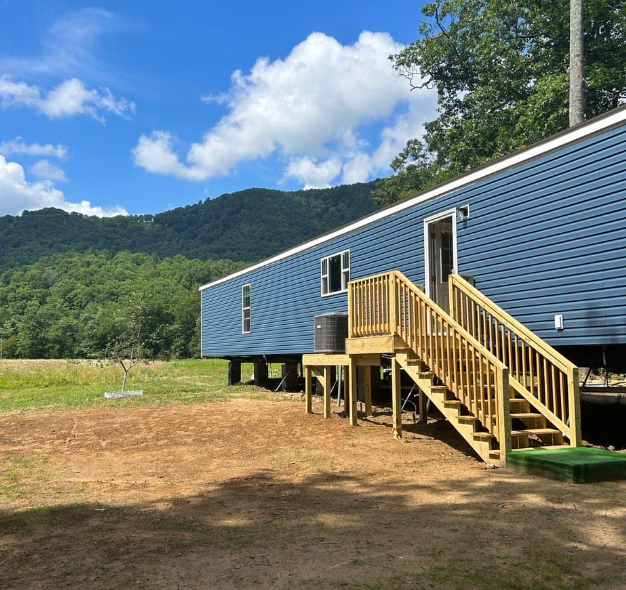One disaster to another: Family of Ukrainian refugees among the missing in NC
When Russian forces invaded the Ukrainian port city of Kherson in February 2022, Anastasiia Novitnia Segen and her family sought a way out.
The family of four, including Segen's husband, Dmytro, their 13-year-old son, Yevhenii, and her 80-year-old mother, Tatiana Novitnia, were accepted into a U.S. humanitarian program and moved to the western North Carolina community of Micaville three months later.
They chose the remote neighborhood in the southern Appalachian Mountains because it was where Segen's sister and brother-in-law had settled decades earlier.
In an open field on her sister's property, Segen and her family moved into a navy blue mobile home just a short walk from the South Toe River. It was paradise compared to Kherson, the first major Ukrainian city seized by Russian forces, where a monthslong occupation and nightly shelling prompted mass evacuations and damaged thousands of residential buildings.
More:'So many hollers': Appalachia's remote terrain slows recovery from Helene
But, after more than a year of peace and tranquility in the North Carolina highlands, the Segens' lives have been beset by a different sort of disaster.
Helene, now one of the deadliest hurricanes in the U.S. in the modern era, soaked the Southeast with record-breaking rainfall, triggering monstrous floods that swept through entire neighborhoods and cities. In Micaville, its surrounding communities and the nearby mountain city of Asheville, the damage was widespread. Landslides and cresting rivers swept away homes, collapsed bridges and washed out hundreds of roads.
Nearly a week after Helene pummeled the region, Segen and her family remain unaccounted for, leaving their relatives in a desperate search to find them.
More:Before and after satellite images show damage in North Carolina from Hurricane Helene

Lysa Gindinova, Segen's niece who lives in Brooklyn, New York, has hovered over her phone since Sept. 26, refreshing local Facebook groups for names of discovered residents and calling rescue teams in the area as well as local, state and federal authorities.
“It’s been 24/7,” Gindinova told USA TODAY. “I'm just on my phone all the time. I cannot function normally. That is all I think about.”
The Segens are among hundreds of people still missing amid expansive communication blackouts, power outages and road damage, all of which has hampered rescue teams traversing the mountainous region.
"We are currently facing significant roadway and infrastructure damage, which is creating significant challenges for both our first responders and our citizens," Yancey County Chairman Jeff Whitson said at a news conference Tuesday. Whitson said that teams were still searching and that crews from as far as New York and Texas were assisting.

The family's mobile home sat on an open field near the South Toe River, a local jewel that in the summer is a popular destination for camping, fishing and tubing.
The river crested early Friday morning, rising nearly 6 feet in seven hours before the gauge was damaged and measurements ceased, according to the National Water Prediction Service. The final update, listed at 7:30 a.m. Friday, said the river was over 6 feet above its flood stage and within 2 feet of its record height.
The last time Gindinova spoke to her aunt was about 6 p.m. Sept. 26 as Helene’s ferocious rains and winds began battering western North Carolina.
“She said 'The water in the river is rising,'" Gindinova said. "She made a joke that she hopes their Titanic – referring to their house – is going to hold."

Since then, Gindinova's calls, texts and social media messages to her aunt and uncle have gone unanswered.
Anastasiia Segen's sister managed to escape further up the mountain with her husband and two children. The children were rescued and told Gindinova that everyone in the family had been confirmed safe, except the Segens.
On Tuesday, Gindinova reached a family friend who had sent a drone over the field where the Segens' home sat on blocks. In footage he shared with Gindinova, the home was nowhere to be seen.
"There's nothing left," Gindinova said.
Contact Christopher Cann by email at ccann@usatoday.com or follow him on X @Chris__Cann.
Disclaimer: The copyright of this article belongs to the original author. Reposting this article is solely for the purpose of information dissemination and does not constitute any investment advice. If there is any infringement, please contact us immediately. We will make corrections or deletions as necessary. Thank you.






